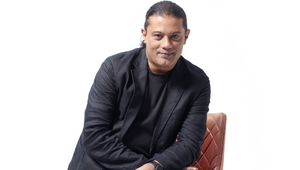
Leo Burnett South Asia, the ‘Human-Agency’, Is Solving The Big Problems Beyond Advertising

If you ask Rajdeepak (Raj) Das about business in Asia, he’ll smile and tell you it's a madhouse. The CCO of Publicis Groupe South Asia, and chairman of Leo Burnett South Asia stresses to outsiders: If you don’t come in, you won’t know what’s going on.
And that’s a shame, because something special is happening in Asia. Post-industrial Asia is a haven for creatives like the ones at Leo Burnett India. As Raj says, you can feel the buzz.
“Every day you get a bit scared you aren’t doing something crazy enough,” Raj says. 14 years after his return to India, having worked around the world, Raj can still barely fathom the creative opportunities in the country.
“The economy is growing so fast,” Raj says. “Fintech is growing so fast, as a creative industry. I always wanted it to be a creative superpower. But it's easy to be number one, it’s hard to remain number one.”
Leo Burnett India’s agency philosophy reflects this urgency. When working on a new campaign, the question Raj puts to his team is always – how is this impacting people’s lives?
“What is good for people is good for brands,” he says.
The goal? Impact a billion.
“I want to impact a billion lives. That is why I wanted to quit advertising, but later fell back in love with it when I saw the human possibilities.”
This vision of Leo Burnett as a ‘humankind agency’ empowers its creatives to work on solving the big issues. Leo Burnett has worked with brands to find creative solutions to big problems, like waste management, water purification, and menstrual education.
As Raj explains, the team are able to tackle these big projects because they don’t think like advertisers.
“I'm not looking at any advertising, my aim is to change the creative landscape for a positive, better India. So that’s it, I'm not getting into advertising, I'm getting into the ecosystem of the government. I'm getting the economy, the structures of people’s lives. I'm looking at financial structures, educational systems, sustainability, anything and everything that is going to fill this country with positivity.”
That’s the thing about Leo Burnett in India; they don’t recruit advertisers. Their recruitment program, called Apollo 11, focuses specifically on bringing people from outside of the industry to work as creatives.
“People in advertising talk in ad language, and talk about the campaign rather than the project,” Raj says. “‘So I started recruiting people from India’s leading tech institutes, whose graduates go on and work at places like Google. We do that because we want people who can solve human problems, not just people who can write a good script. To solve human problems, you need a certain kind of brain. And what we have found is that young Indian graduates want to work with us, because that kind of purpose is hard to find in the broader tech industry.”
Not only is it not crazy, but Apollo 11 is extremely effective, with engineers taking roles as creatives in water sustainability campaigns, and IT graduates assisting on textbook roll-outs in rural areas.
“A lot of brands are doing sustainability now, but they have no way of impacting companies because the chief sustainability officers don't have any power. Companies spend more money on marketing than they spend on curing water. We empower the brand, so suddenly people choose that brand because they like the one that is more sustainable.”
The one constant for Leo Burnett India is that every campaign asks the same questions. Most importantly, Are we really solving human problems? And if so, Is this brand relevant to solving that problem? If the answers are yes, Raj and his team go in “all guns blazing”
While working with a textbook for an Education program, Leo Burnett was able to contribute a chapter for teenagers. The problem they wanted to solve? 23 million girls in India drop out every year, not least because there is no adequate period education in schools.
“In the first year we had one million fewer school dropouts,” Raj says. “The service, or the platform, that we're creating is impacting people's lives.”















